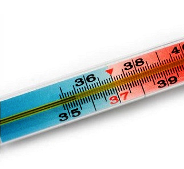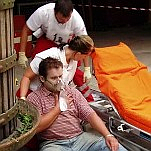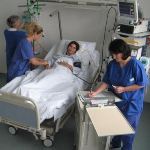ambulance
 Help with hypothermia
Help with hypothermia
Hypothermia is a pathological condition of the body, in which the body temperature drops below the norm necessary to maintain the smooth functioning of metabolic processes. With hypothermia, the body cools down, the body temperature drops to 35ºC and below. Emergency care for hypothermia should be provided by a medical professional in a timely and qualified manner.
Hypothermia, or general hypothermia, is accompanied by inhibition of the basic vital functions of the body. The reason may be a long stay in the cold or in cold water.
 Help with pulmonary bleeding
Help with pulmonary bleeding
Emergency care for pulmonary bleeding should be provided immediately upon detection of this pathological condition. Pulmonary bleeding can occur if the patient has various non-specific processes in the lungs or bronchi - tuberculosis, malignant neoplasms, lung abscess, foreign bodies of the bronchi, chest injuries and others.
In itself, pulmonary bleeding is defined as the release of pure blood from the respiratory tract or an admixture of blood to sputum during coughing (hemoptysis) .
 Help with hyperthermia
Help with hyperthermia
Hyperthermia is an increase in a person's body temperature above 37.5ºC as a result of illness or overheating. Such a pathological condition occurs when the thermal balance is disturbed, when heat production prevails over heat transfer.
Emergency care for hyperthermia is necessary to avoid the occurrence of irreversible processes. When body temperature rises above 41ºC, heat stroke can develop.
 Emergency care for pulmonary edema
Emergency care for pulmonary edema
Let's analyze what emergency care for pulmonary edema is required from a nurse. But first, let's refresh our knowledge about pulmonary edema, the causes and mechanism of occurrence, the clinical picture.
Pulmonary edema is a severe, life-threatening pathological condition in which fluid leaks from the blood and lymphatic vessels into the alveoli. This condition is the result of stagnation in the pulmonary circulation, which can be caused by the following reasons:
 Help for myocardial infarction
Help for myocardial infarction
Myocardial infarction is a necrosis of a section of the heart muscle that develops as a result of an acute violation of the blood supply to the myocardium and is one of the complicated forms of coronary heart disease. Emergency care for myocardial infarction largely determines the prognosis of the disease. The faster and better the assistance provided at the prehospital stage, the more favorable the outcome of the disease.
 Assistance in hypertensive crisis
Assistance in hypertensive crisis
A hypertensive crisis is a condition that occurs as a result of a sharp sudden increase in blood pressure. This condition is urgent, therefore, the provision of assistance in a hypertensive crisis should occur quickly and clearly according to the algorithm.
At the same time, specific high numbers are not singled out. Changes in both the blood pressure indicators themselves and the patient's well-being are assessed individually in each case.
 Help for anaphylactic shock
Help for anaphylactic shock
Immediate assistance for anaphylactic shock is a must for a nurse. The life of the patient depends on the correctness of actions, this must be remembered. therefore, it is so important to know the sequence of actions and clearly follow them in case of anaphylactic shock.



